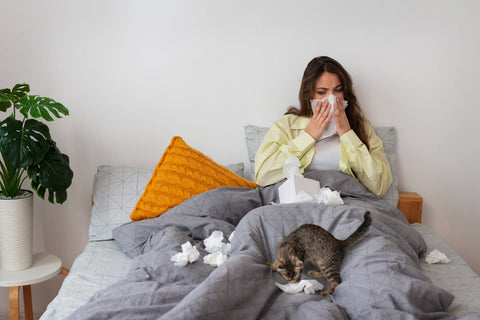Nutritional Supplements to Support Sexual Health
WHAT IS SEXUAL DYSFUNCTION
Sexual dysfunction can be defined as difficulty experienced during any stage of sexual activity including desire, arousal, pleasure, or orgasm. Common issues include erectile dysfunction (ED), premature ejaculation, loss of libido, orgasmic disorder (difficulty in attaining orgasm) and vaginal dryness.
PREVALENCE
Although more common in mid and later life, these types of issues are still prevalent among young adults and can cause fertility problems. Sexual dysfunction tends to be underreported, as often people feel too embarrassed to discuss them, they believe that they are a normal part of ageing, or they do not perceive them to be an important enough reason to visit their doctor. However, a global study revealed that in adults between 40 and 80 years, 28% of men and 39% of women were affected by at least one sexual dysfunction [1].
BENEFITS & RISKS
Aside from being an important factor in many relationships, sex has several health benefits. It has a protective effect against cardiovascular disease, causes a surge in oxytocin and endorphins, which promote relaxation and good quality sleep, reduces stress, anxiety and pain and stimulates feelings of general well-being. Sexual activity has been linked to enhancement of self-esteem and negatively associated with psychiatric disorders, depression and suicide. Early research has indicated a stimulatory effect on the immune system and a negative correlation between ejaculation frequency and prostate cancer risk.
When an individual or couple experiences sexual dysfunction, not only do they miss out on the health benefits, but it can also put strain on the relationship, which can then make the problem worse. Often people enter into a ‘viscous cycle’, where the pressure to perform well leads to anxiety, which then interferes with performance, so the next time they engage in sexual activity, the same process will occur.
LIFESTYLE AND SEXUAL HEALTH
Steps can be taken in order to maintain optimum sexual health, including regular physical activity, consuming healthy nutritious food, stress control and relaxation techniques, getting enough sleep, reducing consumption of alcohol and use of other popular stimulants.
NUTRITIONAL SUPPLEMENTS
One of the most important ways to support sexual health is providing the body with all the nutrients (vitamins, minerals, antioxidants, and amino acids) it needs to maintain normal balance of male and female sex hormones, proper blood circulation to the sex organs, healthy brain and nervous system function, normal cholesterol levels and blood glucose levels, and protection against the damaging effects of free radicals.
In order to help support all areas of male and female sexual function in a holistic way, a properly formulated nutritional supplement should contain all the mentioned below most beneficial vitamins, minerals, amino acids and plant extracts.
Vitamin C & E
Mechanism: Vitamin C and E are antioxidants. They help to protect sperm and egg cell DNA from free radical damage that can lead to fertility problems. This antioxidant protection also extends to nitric oxide, an agent that relaxes and dilates blood vessels. By preventing free radicals from damaging nitric oxide, blood circulation to the genital areas can be improved, increasing sensitivity. Vitamin C also contributes to the reduction of tiredness and fatigue, which can be particularly beneficial if this is the root cause of poor sexual performance.
Evidence: Decreased levels of vitamin C in seminal plasma have been shown to be a risk factor for low sperm morphology and idiopathic male infertility [2]. Vitamin C supplementation in infertile men has shown improvements in sperm count, motility and morphology [3]. Vitamin E supplementation improved sperm motility and led to a significant difference in impregnations [4]. Sexual problems such as erectile dysfunction can be a result of decreased blood flow to the genital regions in both men [5] and women [6]; combined supplementation with vitamins C and E produced beneficial effects on endothelium-dependent vasodilation and arterial stiffness [7]. One randomized, double-blind, placebo-controlled trial reported a greater frequency of sexual intercourse and a quantifiable decrease in depression in subjects taking high dose vitamin C compared with the placebo group [8].
Zinc
Mechanism: There are several links between zinc and sexual function. Zinc aids in the synthesis of the male sex hormone testosterone, which is required for normal sexual health as well as a sense of well-being. Testosterone levels naturally decrease with age and insufficient testosterone can lead to issues such as low libido, depression, erectile dysfunction and infertility. A deficiency in zinc can affect ability to smell and taste, senses which are particularly important for libido. Zinc protects prostate health and deficiency has been linked with prostate enlargement, a common cause for male sexual dysfunction. In women, zinc is involved in maintaining normal reproductive health, including hormonal balance, follicular fluid levels and ovulation.
Evidence: A significant correlation was found between serum testosterone concentration and cellular zinc concentration and dietary zinc restriction was associated with a significant decrease in serum testosterone concentrations [9]. Supplementation in zinc-deficient elderly men for six months increased serum testosterone [9]. One study demonstrated that olfaction, particularly in young adult males is related to libido and an impairment in this sense can cause a loss of the ability to detect subtle chemicals that induce arousal [10]. Acute zinc loss produced taste and smell dysfunction, which was reversed once serum zinc concentration returned to normal [11]. In a study of haemodialysis patients, those who received a zinc supplement showed an improvement in potency, libido and frequency of intercourse compared with placebo [12].
Selenium
Mechanism: Aside from its antioxidant properties, which help to prevent oxidative damage to sperm and egg cell DNA, selenium is also incorporated in specific proteins (selenoproteins) which are involved in spermatogenesis.
Evidence: Selenium is highly concentrated in seminal plasma and significantly correlated with sperm count [13]. It has been demonstrated that supplementation with 200µg selenium in combination with vitamin E daily improved sperm motility, morphology and pregnancy outcome [14].
L-Arginine
Mechanism: The amino acid L-Arginine is a precursor to nitric oxide. Nitric oxide stimulates the relaxation of smooth muscle in blood vessels, causing vasodilation and therefore improving blood flow. Increased blood flow to the genital area is required for sexual function in both males and females.
Evidence: Oral administration of L-Arginine led to a significant subjective improvement in sexual function in men that had decreased nitric oxide levels [15]. L-Arginine used in combination with Yohimbine significantly increased a physiological measure of sexual arousal in post-menopausal women with female sexual arousal disorder [16].
L-Carnitine
Mechanism: L-Carnitine aids energy production by transporting long-chain fatty acids into the cell mitochondria to be metabolised. Reduced energy production can impact not only physical aspects of sexual performance, but also mood.
Evidence: Carnitine was trialled against testosterone in healthy men, aged 60–74, who complained that they felt that they were “slowing down” in various ways such as decreased libido, depressed mood, irritability and fatigue [17]. Testosterone and carnitine significantly improved measures of depression and fatigue; however carnitine outperformed testosterone in improving stamina [17]. Moreover, testosterone significantly increased prostate volume, which carnitine did not [17]. Other research has revealed that men who were unresponsive to drug treatment experienced significant improvements in stamina when combined with a carnitine supplement [18]. This combination was also found to be more effective than drug therapy alone in improving stamina, sexual intercourse satisfaction, orgasm and general sexual well-being [19]. Finally, a male fertility study showed that combined treatment with l-carnitine and l-acetyl-carnitine was effective in increasing sperm motility, especially in groups with lower baseline carnitine levels [20].
L-Methionine
Mechanism: L-methionine influences many functions within the body. It is involved in the synthesis of various neurotransmitters in the brain, including the mood-lifting neurotransmitter serotonin and can thereby improve depressive symptoms (including low libido). L-methionine also leads to the acidification of urine, which can help to prevent urinary tract infections (UTIs), as the bacteria usually responsible cannot survive in an acidic environment. UTIs are more common among women and some tend to be more prone than others. Whilst suffering from a UTI, sexual intercourse can be very uncomfortable, therefore most choose to avoid it during this time.
Evidence: Several studies have demonstrated a positive effect of S-adenosyl-L-methionine (SAMe) - a derivative of methionine naturally produced from methionine in the body - on depressive symptoms [21] [22]. Subjects who were unresponsive to antidepressants significantly lowered their scores on a measure of depression after supplementation with SAMe [22]. During a 26 month trial of L-Methionine supplementation, women who experienced chronically recurrent UTIs, experienced no acute infections and all parameters of inflammation remained in the normal range [23].
L-Phenylalanine
Mechanism: L-Phenylalanine is a precursor to the neurotransmitter dopamine. Dopamine mediates pleasure in the brain; it is released during pleasurable experiences such as eating, having sex and taking drugs and stimulates us to seek out these experiences again.
Evidence: Phenylalanine deficiency leads to decreased dopamine synthesis [24]. Women who were phenylalanine/tyrosine depleted exhibited lower mood and energy and increased irritability scores [25]. A study reported a significant association between the dopamine receptor gene (DRD4) and measures of sexual behavior including desire, arousal and function [26].
Korean Ginseng
Mechanism: This ancient herb has long been reputed for its energy-enhancing, aphrodisiac and adaptogenic properties. The active compounds in Korean ginseng, known as ginsenosides are steroid-like in structure, which helps support adrenal function and counteract adverse effects of physical and psychological stress [27]. They also promote nitric oxide release, thereby improving blood flow [28].
Evidence: Numerous studies have shown positive outcomes for sexual function in both men and women with Korean ginseng. Stamina scores and reports of penetration and maintenance were significantly higher in those treated with Korean ginseng than those receiving placebo and 60% of subjects reported that Korean ginseng improved stamina [29]. Korean ginseng extract significantly improved scores on a measure of female sexual function in menopausal women [30].
Ginkgo Biloba
Mechanism: The active components of Ginkgo biloba are potent platelet-activating factor antagonists and vasodilators; thereby improving blood circulation to the genital area and heightening sexual sensation. They are also involved in neurotransmitter modulation, which aids mental acuity and improves mood.
Evidence: Daily doses of Ginkgo biloba extract were 84% effective in helping reduce antidepressant-induced sexual dysfunction in men and women and had a positive effect on desire, excitement (stamina and lubrication), orgasm and resolution (afterglow) [31].
CONCLUSION
Sexual dysfunction is a common issue affecting men and women, which can have negative impacts on health, well-being and relationships. Via the various mechanisms discussed above, a combination of listed above vitamins, minerals, antioxidants, amino acids, and plant extracts can be very beneficial and suitable for men and women, offering comprehensive nutritional support for various aspects of sexual function and health.
REFERENCES
[1] Nicolosi, A., Laumann, E. O.,Glasser, D. B., et al., (2004). Sexual behavior and sexual dysfunctions after age 40: The global study of sexual attitudes and behaviors. Urology 64(5), 991-997.
[2] Colagar, A. H., & Marzony, E. T., (2009). Ascorbic Acid and Human Seminal Plasma: Determination and Its Relationship to Sperm Quality. Journal of Clinical Biochemistry and Nutrition 45(2), 144-149.
[3] Akmal, M., Qadri, J. Q., Al-Waili, N. S., et al., (2006). Improvement in Human Semen Quality After Oral Supplementation of Vitamin C. Journal of Medicinal Food 9(3), 440-442.
[4] Suleiman, S. A., Elamin, M., Ali, F. Z., et al., (1996). Lipid Peroxidation and Human Sperm Motility: Protective Role of Vitamin E. Journal of Andrology, 17(5).
[5] Schwartz, B. G., & Kloner, R. A., (2011). Cardiovascular Implications of Erectile Dysfunction. Circulation 123.
[6] Goldstein, I., & Find all citations by this author (default).Or filter your current search Berman, J. R., (1998). Vasculogenic female sexual dysfunction: vaginal engorgement and clitoral erectile insufficiency syndromes. International Journal of Impotence Research 10 (2).
[7] Plantinga, Y., Ghiadoni, L., Magagna, A., et al., (2007). Supplementation With Vitamins C and E Improves Arterial Stiffness and Endothelial Function in Essential Hypertensive Patients. American Journal of Hypertension 20(4), 392-397.
[8] Brody, S., (2002). High-Dose Ascorbic Acid Increases Intercourse Frequency and Improves Mood: A Randomized Controlled Clinical Trial. Biological Psychiatry 52(4), 371–374.
[9] Prasad, A. S., Mantzoros, C. S., Beck, F. W J., et al., (1996). Zinc status and serum testosterone levels of healthy adults. Nutrition 12(5), 344–348.
[10] Ottaviano, G., Zuccarello, D., Frasson, G., et al., (2013). Olfactory sensitivity and sexual desire in young adult and elderly men: An introductory investigation. American Journal of Rhinology & Allergy 27(3),157-161.
[11] Henkin, R, I., Patten, B. M., Re, P. K., et al., (1975). A Syndrome of Acute Zinc Loss : Cerebellar Dysfunction, Mental Changes, Anorexia, and Taste and Smell Dysfunction. Archives of Neurology 32(11), 745-751.
[12] Mahajan, S. K., Abbasi, A. A., Prasad, A. S., et al., (1982). Effect of oral zinc therapy on gonadal function in hemodialysis patients. A double-blind study. Annals of Internal Medicine 97(3).
[13] Bleau, G., Lemarbre, J., Faucher, G., et al., (1984). Semen selenium and human fertility. Fertility and Sterility 42(6), 890-4.
[14] Moslemi, M. K., & Tavanbakhsh, S., (2011). Selenium–vitamin E supplementation in infertile men: effects on semen parameters and pregnancy rate. International Journal of General Medicine 4, 99–104.
[15] Chen, J., Wollman, Y., Chernichovsky, T., et al., (1999). Effect of oral administration of high-dose nitric oxide donor L-arginine in men with organic erectile dysfunction: results of a double-blind, randomized, placebo-controlled study. BJU International 83(3), 269-73.
[16] Meston, C. M., & Worcel, M., (2002). The effects of yohimbine plus L-arginine glutamate on sexual arousal in postmenopausal women with sexual arousal disorder. Archives of Sexual Behaviour 31, 323-332.
[17] Cavallini, G., Caracciolo, S., Vitali, G., et al., (2004). Carnitine versus androgen administration in the treatment of sexual dysfunction, depressed mood, and fatigue associated with male aging. Urology 63(4), 641–646.
[18] Gentile, V., Vicini, P., Prigiotti, G., et al., (2004). Preliminary observations on the use of propionyl-L-carnitine in combination with sildenafil in patients with erectile dysfunction and diabetes. Current Medical Research and Opinion 20, 1377-1384.
[19] Cavallini, G., Modenini, F., Vitali, G., et al., (2005). Acetyl-L-carnitine plus propionyl-L-carnitine improve efficacy of sildenafil in treatment of erectile dysfunction after bilateral nerve-sparing radical retropubic prostatectomy. Urology 66, 1080-1085.
[20] Lenzi, A., Sgro, P., Salacone, P., et al., (2004). A placebo-controlled double-blind randomized trial of the use of combined L-carnitine and L-acetyl-carnitine treatment in men with asthenozoospermia. Fertility and Sterility 81(6).
[21] Mischoulon, D., & Fava, M., (2002). Role of S-adenosyl-L-methionine in the treatment of depression: a review of the evidence. American Journal of Clinical Nutrition 76.
[22] Papakostas, G. I., Mischoulon, D., Shyu, I., et al., (2010). S-Adenosyl Methionine (SAMe) Augmentation of Serotonin Reuptake Inhibitors for Antidepressant Nonresponders With Major Depressive Disorder: A Double-Blind, Randomized Clinical Trial. American Journal of Psychiatry 167, 942–948.
[23] Fünfstück, R., Straube, E., Schildbach, O., et al., (1997). Prevention of reinfection by L-methionine in patients with recurrent urinary tract infection. Medizinische Klinik (Munich) 92(10), 574-81.
[24] Lou, H. C., (1994). Dopamine precursors and brain function in phenylalanine hydroxylase deficiency. Acta Paediatrica Supplement 407, 86-8.
[25] Leyton, M., Young, S. N., Pihl, R. O., et al., (2000). Effects on Mood of Acute Phenylalanine/Tyrosine Depletion in Healthy Women. Neuropsychopharmacology 22, 52–63.
[26] Zion, I., Tessler, R., Cohen, L., et al., (2006). Polymorphisms in the dopamine D4 receptor gene (DRD4) contribute to individual differences in human sexual behavior: desire, arousal and sexual function. Molecular Psychiatry 11, 782–786.
[27] Nocerino, E., Amato, M., & IzzoU, A. A., (2000). Review The aphrodisiac and adaptogenic properties of ginseng. Fitoterapia 71.
[28] Murphy, L.L., & Lee, T. J., (2002). Ginseng, sex behavior, and nitric oxide. Annals of the New York Academy of Sciences 962, 372-7.
[29] See comment in PubMed Commons below[29] Hong, B., Ji, Y. H., & Hong, J. H., (2002). A double-blind crossover study evaluating the efficacy of korean red ginseng in patients with erectile dysfunction: a preliminary report. Journal of Urology 168(5), 2070-3.
[30] Oh, K. J., Chae, M. J., Lee, H. S., et al., (2010). Effects of Korean red ginseng on sexual arousal in menopausal women: placebo-controlled, double-blind crossover clinical study. The Journal of Sexual Medicine 7(4), 1469-77.
[31] Cohen, A. J., & Bartlik, B., (1998). Ginkgo biloba for antidepressant-induced sexual dysfunction. Journal of Sex and Marital Therapy 24(2), 139-43.
Any information or product suggested on this website is not intended to diagnose, treat, cure or prevent any medical condition. Never disregard medical advice or delay in seeking it because of something you have read on this website. Consult your primary healthcare physician before using any supplements or making any changes to your regime.




